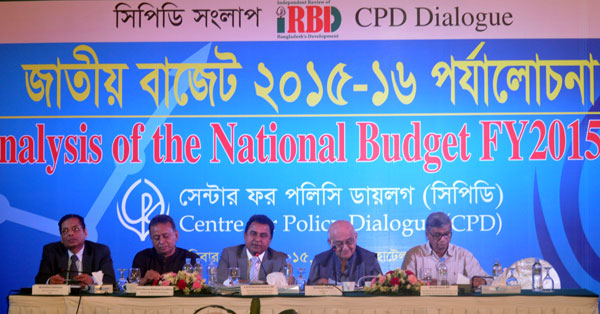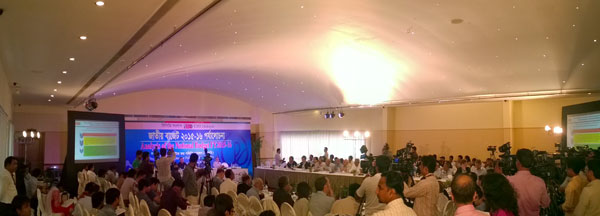The government should put in place necessary economic and institutional reforms to come out of the culture of hasty public expenditure during the last quarter of a fiscal year.
The reforms are also expected to improve the quality of ADP implementation that currently suffers from the ever-increasing number of projects and indiscipline without result-based monitoring.
In addition to these observations, more deliberations on the CPD Analysis of the National Budget FY2016 by a broad range of stakeholders surfaced during a CPD dialogue held as part of CPD IRBD programme at Lakeshore Hotel on Saturday, 13 June 2015.

CPD Chairman Professor Rehman Sobhan, moderator of the discussion, mentioned that the dialogue on the national budget aims to facilitate the professional group of stakeholders to have an exposure on the budget and express themselves in a constructive way.
In light of the discussion, the finance ministry and concerned officials could take the opportunity to revisit the budget, he added.
In his keynote presentation, CPD Executive Director Professor Mustafizur Rahman posited a number of challenges for the budget as regards macroeconomic context, fiscal framework, budgetary measures and reforms.
According to the CPD analysis, the FY2016 budget envisioned high growth of revenue targeted for underwriting overreaching expenditure. Professor Rahman mentioned that revenue expenditure targets appeared to be alright but financing of fiscal framework was somewhat questionable as financing is increasingly being dependent on the anticipation of high foreign financing.
Other major challenges were declining allocation for the social sectors, health and agriculture, lack of governance in ADP implementation, and a number of budgetary and fiscal measures related to taxation, customs and supplementary duty, private investment, incentive in power and energy, discontinued initiatives etc. and necessary economic and institutional reforms as suggested by the CPD.
The analysis suggested that future budgets could contain a matrix articulating the progress of key initiatives in the preceding budget, a plan and timeline for key milestones to be achieved during the budget period.
Addressing as Guest of Honour Mr Amir Khosru Mahmud Chowdhury, Member, Advisory Council of the BNP Chairperson particularly raised concern on setting aside the taxpayers’ money for recapitalising the state-owned banks. He felt that it is a wrong response to the anomaly and mismanagement in the banking system and indiscipline in the financial sector.
Special Guest Mr M A Mannan, MP, Hon’ble State Minister for Finance and Planning, observed that budget formulation is negotiated amidst the influences of various pressure groups, and one of the nagging problem is that the budget continues to suffer from systemic wastage and misallocation.
Chief Guest Mr A H M Mustafa Kamal, MP, Hon’ble Minister for Planning highlighted a number of achievements of the government in formulating and implementing the budget as well as the government’s step-by-step planning regarding financing the budget.
During the floor discussion, Dr A B Mirza Azizul Islam, Former Advisor to the Caretaker Government observed that most ministries, despite knowing their expected allocation, remain relatively idle in procurement mechanism due to the administrative inertia.
A mid-term review on how the budget is being implemented would ensure more transparency in the process, mentioned Mr Md Fayekuzzaman, Managing Director, Investment Corporation of Bangladesh (ICB).
Dr Biru Paksha Paul, Chief Economist, Bangladesh Bank, mentioned that the upcoming budget would be very challenging because the government is in agreement with the IMF to effectively put in place the 15 percent VAT in support of revenue collection.
Mr Arastoo Khan, Member, Physical Infrastructure Division noted that 18 percent of the revenue budget goes for interest payment in contrast to lower allocation for programme budget. Another offsetting factor is the concessional loans Bangladesh availed from the likes of EU and China.
Ms Selima Ahmad, President, Bangladesh Women’s Chamber of Commerce and Industry urged that ADP allocation related to women’s development should be disbursed earlier rather than the last quarter to ensure effective utilisation.
Among other concerns, Dr Wajedul Islam Khan, General Secretary, Bangladesh Trade Union Kendra urged to develop state-owned enterprises in parallel to private enterprises to ensure labour welfare across the society and put in place healthcare and residence facilities for them through PPP initiatives.
Dr Md Mozibur Rahman, Former Chief Executive Officer, Bangladesh Foreign Trade Institute (BFTI) urged lowering on 10 percent VAT on SME and also high interest at 18-25 percent on SME loans.
Speaking on infrastructural development, Dr Md Azizur Rahman, Chairman, Bangladesh Tariff Commission informed that the government did not allocate anything for the Kaliakoir High-tech-Park in Gazipur because it is planned to be done through PPP.
Mr Md Atiqul Islam, President, BGMEA raised the issues of branding of Bangladesh in the international business arena where the RMG sector is losing its positive image.
On the same note, Mr M S Shekil Chowdhury, Chairperson, Centre for Non Resident Bangladeshis urged to ensure further budgetary allocation and accountability to enhance consular services in the Bangladesh missions abroad.
On education, Professor Aminur Rahman, Head, Department of Economics, Independent University, Bangladesh urged to withdraw VAT from the private universities. Mr K M Enamul Hoque, Deputy Director, CAMPE, cautioned that decreasing the budgetary allocation in education will seriously affect teachers’ training and human resource development.
On health, Ms Priti Chakraborty, Chairman, Aysha Memorial Specialised Hospital (Pvt.) Ltd. pointed at the extreme scarcity of doctors in respect of the growing population and urged to increase allocation in the health sector.
Mr Monoj Kumar Roy, Additional Secretary (FTA), Ministry of Commerce found it discouraging to impose tax on government employees while their pay has been decreased.
The floor discussion was also addressed by Mr M Anis Ud Dowla, Former President, MCCI; Dr Omar Farooq Khan, Senior Development Advisor, CIDA, Canadian High Commission; Mr Mohammed Nurul Amin, Managing Director & CEO, Meghna Bank Limited; Dr Maleka Banu, General Secretary, Bangladesh Mahila Parishad; Mr Habibullah Bahar, Senior Economic Adviser, MCCI among others.
TV News Clip on the Event
[Youtube_Channel_Gallery feed=”playlist” user=”PLlQrg2sIO-ExUK9_0kbDbYaFKirGaJC1v” videowidth=”580″ ratio=”16×9″ theme=”light” color=”white” autoplay=”0″ rel=”1″ showinfo=”1″ maxitems=”18″ thumb_ratio=”16×9″ thumb_width=”250″ thumb_columns_ld=”3″ thumb_columns_phones=”1″ thumb_columns_tablets=”4″ thumb_columns_md=”4″ title=”1″ description=”1″ descriptionwordsnumber=”20″
key=”AIzaSyA1mm3ICAhBQjVzwjpUMAe5Lb5FxbfloRo”]



